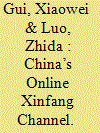| Srl | Item |
| 1 |
ID:
181905


|
|
|
|
|
| Summary/Abstract |
Xinfang, as a major participation channel in China, sets social stability as its most important objective. The way it seeks to balance the participation-institutionalisation dynamic is thus key to understanding its function. Drawing on detailed interviews and archival sources, this study clarifies the practice and rationale of the new and important online xinfang channel which has not, to date, been amply examined. By integrating offline communication methods with the new online format, it achieves a subtler form of participation through field diversion, standardised settlement, and balanced evaluation, and thus partly corrects the offline xinfang channel’s heavy reliance on non-institutionalised tactics to maintain stability. However, as long as xinfang still operates at the intersection of law and politics, the question of how to balance citizens’ desire for participation and an appropriate level of institutionalisation remains a noteworthy issue, since stability is only achieved when these two elements are in equilibrium.
|
|
|
|
|
|
|
|
|
|
|
|
|
|
|
|
| 2 |
ID:
157295


|
|
|
|
|
| Summary/Abstract |
Based on intensive fieldwork in a district in China, this article illustrates that “power–interest networks” (quanli liyi wangluo) work as pre-existing tools for social control, specifically to govern residents’ behaviour when they engage in any protest against the state. The networks originated from an institutional setting in which local authorities have been the largest resource grabber and where personal ties have mainly determined resource allocation decisions. Residents who are capable of using networks to operate via the back door thus get rich, but their dependence on networks also poses constraints on their anti-demolition protests. By contrast, residents who are incapable of using networks tend to lag behind, but their marginalised status unexpectedly offers them greater autonomy to negotiate a better bargain with local authorities. The differences reveal a “half-open” state control through resources allocation, which seems to work for residents who have intensive interactions with local authorities but not for others who are self-sufficient. The existence of networks sheds light on the importance of local politics in determining Chinese protests and has not been amply discussed in recent years. Networks also reinforce the operational rationale of “relational repression”, shaped not only by sanctions and sentiments but also by benefits.
|
|
|
|
|
|
|
|
|
|
|
|
|
|
|
|